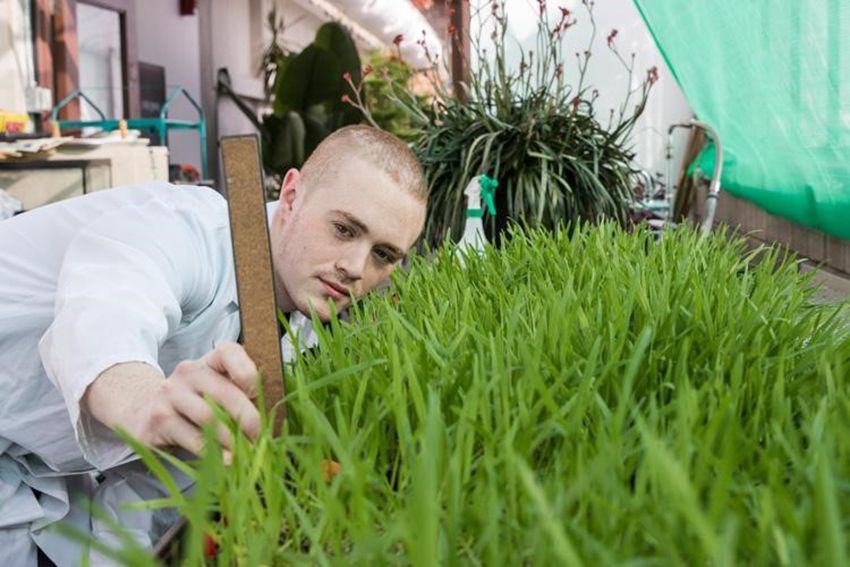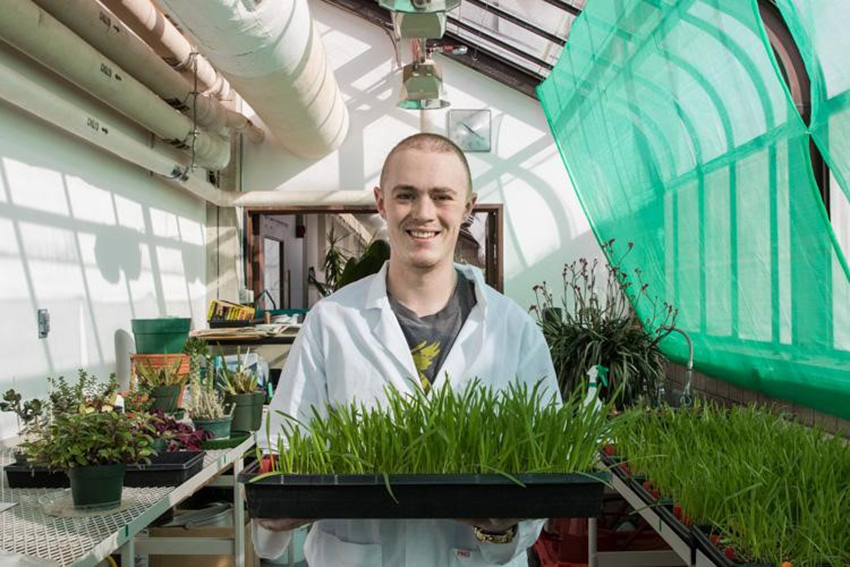MRU research duo investigating impacts of ski and snowboard wax on plant growth

James Walker hopes that one day his findings can contribute to informing the development of wax products that have no impact on the natural flora.
Most favourite Alberta ski resorts start popping up about an hour or so to the west of Calgary and are traditionally carved out of pristine natural environments located in protected areas such as national parks. Needless to say, these areas require delicately balancing their host of recreational activities with preserving the natural beauty that creates their allure.
Curious to the impacts some of these activities may have, two Mount Royal researchers are bringing the slopes to the lab to investigate if ingredients in ski and snowboard waxes are equating to unintentional environmental slip-ups for Nordic stewards.
James Walker is a third-year Bachelor of Science - Health Science student supporting the work of Mount Royal professor and course coordinator for the Earth and Environmental Sciences major (and fellow PADS service dog trainer), Gwen O'Sullivan, as they investigate the existence and impacts of fluorinated hydrocarbons in ski and snowboard waxes.
Fluorinated hydrocarbons are inert, liquid or gaseous organic compounds similar to a hydrocarbon, but have fluorine atoms in the place of hydrogen atoms that are usually bad for the environment, and are commonly used in aerosol propellants and refrigerants.
O'Sullivan's research interests are in the field of environmental forensics, and, in particular, the behaviour of persistent organic pollutants (POPs) in the environment.
"Ski waxes may contain levels of POPs," says O'Sullivan. "Living in a city where winter sports are common, I am interested in looking at the level in the environment and the potential influence on plant growth, in particular looking at spring growth."

This research supports Walker's love of being in the lab and MRU's rooftop greenhouse.
For Walker, connecting with O'Sullivan through mutual participation in the PADS program opened him up to the possibilities of undergraduate research at MRU. This opportunity has also supported his love of being in the lab and MRU's rooftop greenhouse.
"For most skiers and snowboarders, it's important that we know what our impact is on the environment," says Walker. "Honestly, it's something that had never crossed my mind before hearing about Gwen's work."
Despite being initially challenged with developing his method, he's now using gas chromatography-mass spectrometry to determine what each wax compound is made of before testing solutions on grass, alfalfa, and soil samples to determine the impacts on growth rates from seed, emulating spring. He will be subsequently testing the plants to see if there is any uptake of the waxes.
"It's real science, you know, trial and error," says Walker. "Making lots of mistakes and tweaking to figure out what exactly is going on. It's rewarding."
Walker is currently performing his inquiry as part of an independent research course - an attempt to address a question using existing data or data collected by the researcher.
"It is always inspiring to work with enthusiastic and engaged students like James," says O'Sullivan. "To observe someone catching the research 'bug' reminds me of the joy of research and the great potential contributions that these students will make to science."
Knowing where to start can be challenging, she says, but suggests starting with thinking about what subjects are of interest, and then not being shy to approach relevant academics.
For Walker, venturing into undergraduate research is important for him in becoming well-rounded knowledge-wise, and in understanding the world around him. He hopes that one day his findings can contribute to informing the development of wax products that have no impact on the natural flora.
"It's very early to say for sure, but it seems to me that the plants in the fluorinated soil could be growing slower," says Walker. He will disseminate his findings at the Faculty of Science and Technology Research Day, which will be used to structure future research.
